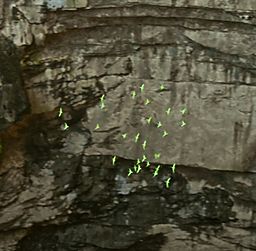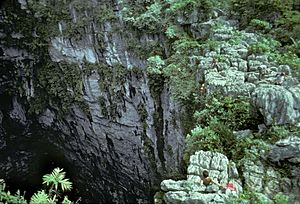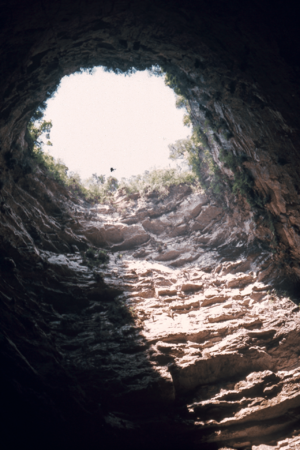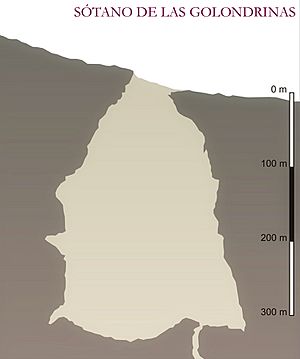Cave of Swallows facts for kids
Quick facts for kids Sótano de las Golondrinas |
|
|---|---|

A flock of conures in the Cave of Swallows
|
|
| Location | Aquismón, San Luis Potosí, Mexico |
| Length | VR = 515 m Entrance pit:
|
| Discovery | December 27, 1966 |
| Hazards | Free fall |
| Access | No restrictions to view entrance; permit required to descend |
The Cave of Swallows, also known as Sótano de las Golondrinas in Spanish, is a giant open-air pit cave in Mexico. It's located in the area of Aquismón, San Luis Potosí. Imagine a huge hole in the ground that opens up to the sky!
The cave's entrance is shaped like an oval. It measures about 49 by 62 meters wide. This opening sits on a sloped area made of karst rock. Inside, the cave gets even wider. It opens into a massive room about 303 by 135 meters across. The bottom of the cave is incredibly deep. From the lowest edge, it's a 333-meter (1,092-foot) straight drop. From the highest edge, it's 370 meters (1,214 feet) down. This makes it one of the largest cave shafts on Earth. It's also the second deepest pit in Mexico.
Contents
Discovering the Cave
The local Huastec people have known about this amazing cave for a very long time. It was first shown to T. R. Evans, Charles Borland, and Randy Sterns on December 27, 1966. The first time anyone officially went down into the cave was on April 4, 1967.
How the Cave Formed
This cave was created in limestone rocks. These rocks are from the Middle Cretaceous period, which was millions of years ago. The cave formed when water slowly dissolved the rock along a crack. Over time, this crack grew bigger and bigger. This process, called "solutional enlargement," made the cave into the huge pit we see today.
Why it's Called the Cave of Swallows
The Spanish name Sótano de las Golondrinas means Basement of the Swallows. This name comes from the many birds that live in the cave. They make their homes in holes along the cave walls. Most of these birds are actually white-collared swifts and green parakeets. Real swallows are not very common here.
Every morning, huge groups of birds fly out of the cave. They fly in big circles, going higher and higher until they reach the entrance. In the evenings, many swifts gather around the cave's mouth. About once a minute, a group of around 50 birds will break away. They fly straight down towards the opening. When they cross the edge, they pull in their wings. They free-fall almost all the way down! Then, they open their wings and pull out of the dive. They stop just above their nests. Watching this amazing sight has become very popular with tourists.
Inside the Cave
The air inside the cave is quite cool. Near the entrance, you can see lots of plants growing. The floor of the cave is covered with a thick layer of natural material and guano (bird droppings). The cave is home to many creatures. You might find millipedes, scorpions, insects, snakes, and, of course, birds.
From the very bottom of the main shaft, there are more narrow tunnels. These are known as "The Crevice." They go down another 140 meters (459 feet). This makes the total depth of the cave about 515 meters (1,690 feet). The lowest point you can reach in the cave is about 300 meters above sea level.
Adventure Sports at the Cave
The Cave of Swallows is a very popular place for vertical caving. This is a type of caving where people go up and down deep pits. Cavers attach their ropes to strong anchors near the low side of the entrance. It can take up to an hour to rappel (go down on a rope) all the way to the bottom. Climbing back out can take even longer, from 40 minutes to over two hours!
Because it's such a deep, straight drop, the cave is also famous for BASE jumping. This is an extreme sport where people jump from a fixed object with a parachute. A person without a parachute would fall for almost ten seconds to reach the bottom! BASE jumpers can get out of the cave much faster, usually in about 10 minutes, using a special winch.
See also
 In Spanish: Sótano de las Golondrinas para niños
In Spanish: Sótano de las Golondrinas para niños
- Cenote, a type of sinkhole or cave found in Mexico's Yucatan Peninsula
- List of caves
- List of sinkholes of Mexico
 | Ernest Everett Just |
 | Mary Jackson |
 | Emmett Chappelle |
 | Marie Maynard Daly |




